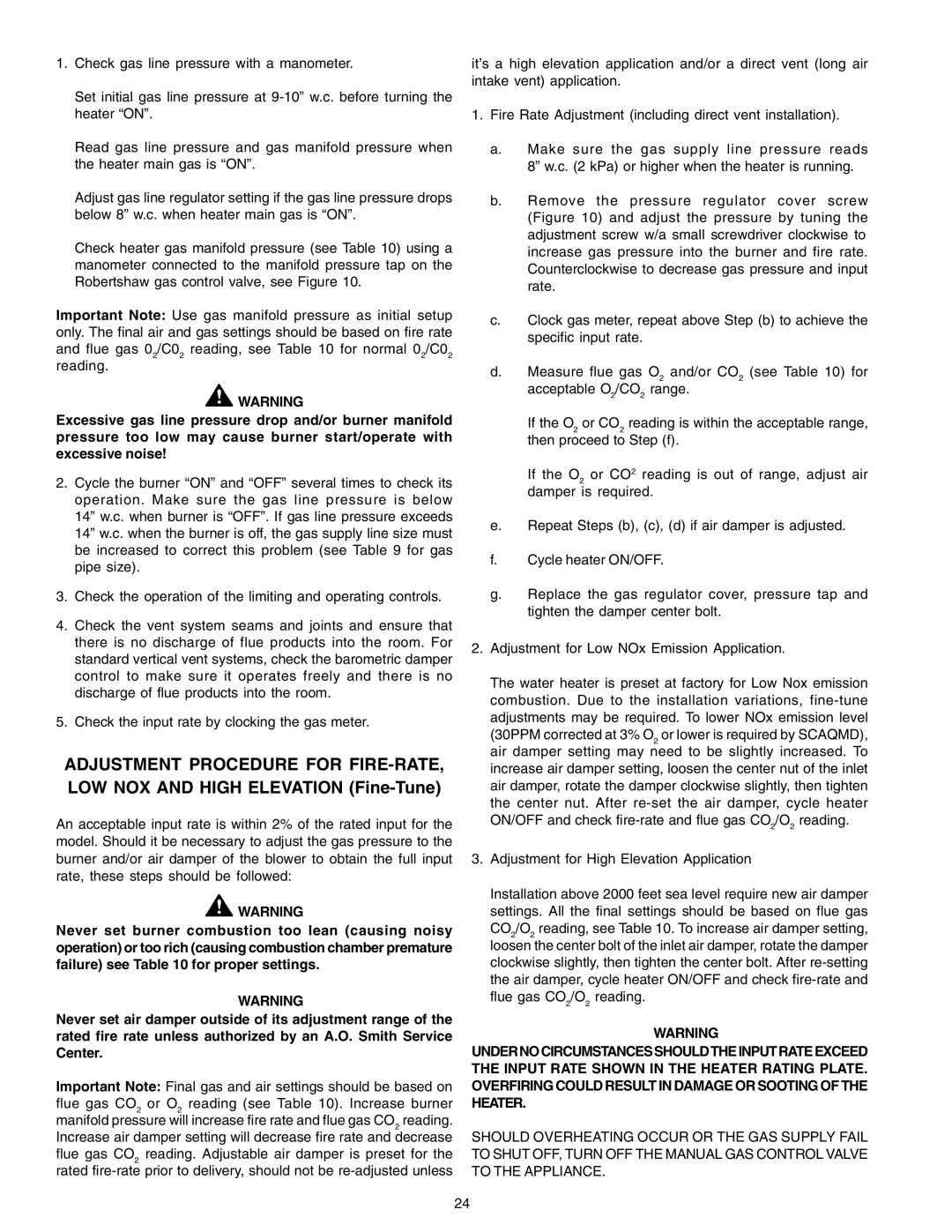1.Check gas line pressure with a manometer.
Set initial gas line pressure at 9-10” w.c. before turning the heater “ON”.
Read gas line pressure and gas manifold pressure when the heater main gas is “ON”.
Adjust gas line regulator setting if the gas line pressure drops below 8” w.c. when heater main gas is “ON”.
Check heater gas manifold pressure (see Table 10) using a manometer connected to the manifold pressure tap on the Robertshaw gas control valve, see Figure 10.
Important Note: Use gas manifold pressure as initial setup only. The final air and gas settings should be based on fire rate and flue gas 02/C02 reading, see Table 10 for normal 02/C02 reading.
 WARNING
WARNING
Excessive gas line pressure drop and/or burner manifold pressure too low may cause burner start/operate with excessive noise!
2.Cycle the burner “ON” and “OFF” several times to check its operation. Make sure the gas line pressure is below 14” w.c. when burner is “OFF”. If gas line pressure exceeds 14” w.c. when the burner is off, the gas supply line size must be increased to correct this problem (see Table 9 for gas pipe size).
3.Check the operation of the limiting and operating controls.
4.Check the vent system seams and joints and ensure that there is no discharge of flue products into the room. For standard vertical vent systems, check the barometric damper control to make sure it operates freely and there is no discharge of flue products into the room.
5.Check the input rate by clocking the gas meter.
ADJUSTMENT PROCEDURE FOR FIRE-RATE, LOW NOX AND HIGH ELEVATION (Fine-Tune)
An acceptable input rate is within 2% of the rated input for the model. Should it be necessary to adjust the gas pressure to the burner and/or air damper of the blower to obtain the full input rate, these steps should be followed:
 WARNING
WARNING
Never set burner combustion too lean (causing noisy operation) or too rich (causing combustion chamber premature failure) see Table 10 for proper settings.
 WARNING
WARNING
Never set air damper outside of its adjustment range of the rated fire rate unless authorized by an A.O. Smith Service Center.
Important Note: Final gas and air settings should be based on flue gas CO2 or O2 reading (see Table 10). Increase burner manifold pressure will increase fire rate and flue gas CO2 reading. Increase air damper setting will decrease fire rate and decrease flue gas CO2 reading. Adjustable air damper is preset for the rated fire-rate prior to delivery, should not be re-adjusted unless
it’s a high elevation application and/or a direct vent (long air intake vent) application.
1.Fire Rate Adjustment (including direct vent installation).
a.Make sure the gas supply line pressure reads 8” w.c. (2 kPa) or higher when the heater is running.
b.Remove the pressure regulator cover screw (Figure 10) and adjust the pressure by tuning the adjustment screw w/a small screwdriver clockwise to increase gas pressure into the burner and fire rate. Counterclockwise to decrease gas pressure and input rate.
c.Clock gas meter, repeat above Step (b) to achieve the specific input rate.
d.Measure flue gas O2 and/or CO2 (see Table 10) for acceptable O2/CO2 range.
If the O2 or CO2 reading is within the acceptable range, then proceed to Step (f).
If the O2 or CO2 reading is out of range, adjust air damper is required.
e.Repeat Steps (b), (c), (d) if air damper is adjusted.
f.Cycle heater ON/OFF.
g.Replace the gas regulator cover, pressure tap and tighten the damper center bolt.
2.Adjustment for Low NOx Emission Application.
The water heater is preset at factory for Low Nox emission combustion. Due to the installation variations, fine-tune adjustments may be required. To lower NOx emission level
(30PPM corrected at 3% O2 or lower is required by SCAQMD), air damper setting may need to be slightly increased. To increase air damper setting, loosen the center nut of the inlet air damper, rotate the damper clockwise slightly, then tighten the center nut. After re-set the air damper, cycle heater ON/OFF and check fire-rate and flue gas CO2/O2 reading.
3.Adjustment for High Elevation Application
Installation above 2000 feet sea level require new air damper settings. All the final settings should be based on flue gas
CO2/O2 reading, see Table 10. To increase air damper setting, loosen the center bolt of the inlet air damper, rotate the damper clockwise slightly, then tighten the center bolt. After re-setting the air damper, cycle heater ON/OFF and check fire-rate and flue gas CO2/O2 reading.
 WARNING
WARNING
UNDERNOCIRCUMSTANCESSHOULDTHEINPUTRATEEXCEED THE INPUT RATE SHOWN IN THE HEATER RATING PLATE. OVERFIRING COULD RESULT IN DAMAGE OR SOOTING OF THE HEATER.
SHOULD OVERHEATING OCCUR OR THE GAS SUPPLY FAIL TO SHUT OFF, TURN OFF THE MANUAL GAS CONTROL VALVE TO THE APPLIANCE.
